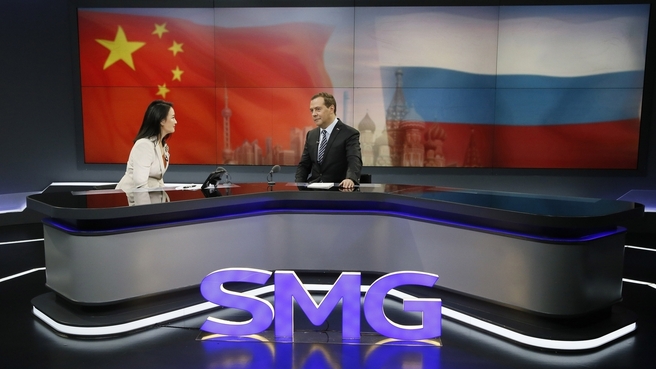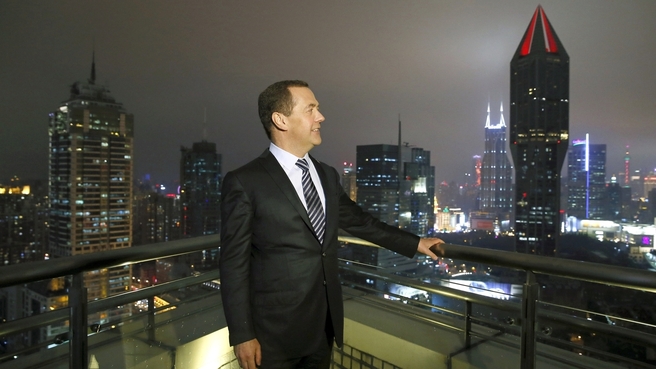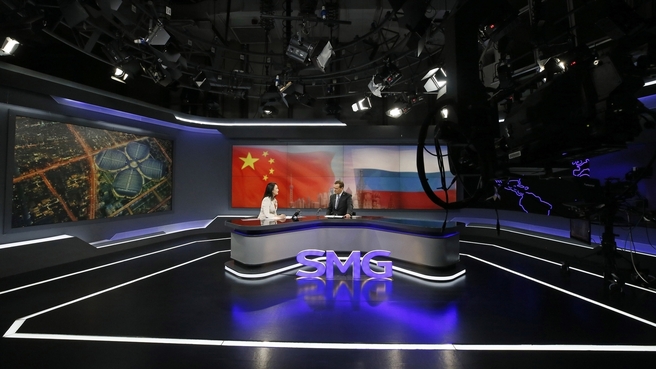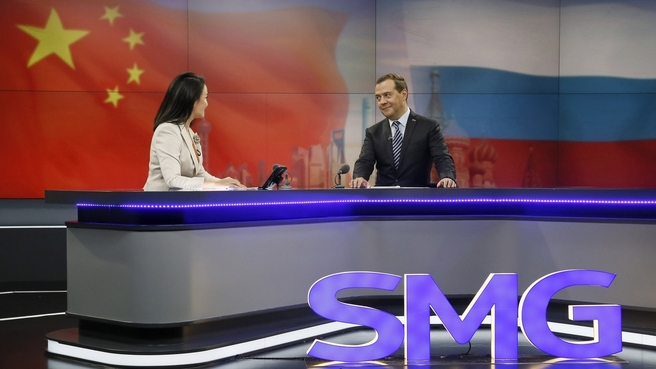The Prime Minister answered questions online at the Shanghai Media Group headquarters.
Dmitry Medvedev participated in an online conference with Chinese internet users at the headquarters of the Shanghai Media Group.
Excerpts from the transcript:
Yuan Ming (via interpreter): This morning, the first China International Import Expo opened in Shanghai. Russia is taking part in the exhibition as one of 12 honoured guests. The Prime Minister of the Russian Federation arrived in Shanghai as the head of the Russian delegation to attend the opening ceremony. Today we are pleased to welcome the Prime Minister at the Shanghai Media Centre. Thank you for coming here to answer questions from internet users.
Welcome!
Dmitry Medvedev: Ni hao! Hello!
Question (via interpreter): Mr Prime Minister, in 2010, you visited World Expo in Shanghai. And now, eight years later, you came to Shanghai again. I would like to ask you what Russian-made innovations have the Russian Government and companies bought to the import expo?
Visit
-
Dmitry Medvedev’s meeting with Prime Minister of Pakistan Imran Khan
-
Dmitry Medvedev’s meeting with President of the BRICS New Development Bank Kundapur Vaman Kamath
-
Dmitry Medvedev’s meeting with President of China Xi Jinping
-
Meeting with Prime Minister of the People’s Republic of China Li Keqiang
-
23rd regular meeting of Russian and Chinese heads of government
-
Dmitry Medvedev lays a wreath at the Monument to the People's Heroes in Beijing
Dmitry Medvedev: First of all, I would like to say that the idea of this exhibition is very appropriate and interesting. There are not so many exhibitions of this kind in the world, focused on imports. Moreover, in this case, it is a large full-fledged exhibition attended by companies from different countries. The opening ceremony today was attended by heads of state and government. It was a big-time event with President Xi Jinping opening the expo and other speakers following.
We mentioned that the world now pays a lot of attention to exports, but this is the first expo to be entirely devoted to imports – at least on such a system-wide basis. We are happy to participate. I wanted to thank our Chinese friends once again for inviting us as a partner country.
Russian companies from some 50 percent of the country’s regions have come to this exhibition – large groups representing regional businesses with their products, ideas and proposals.
I explored country pavilions together with my colleagues, and after that we toured the Russian part of the exhibition. It contains a large number of various goods including food, appliances and agricultural equipment, and in general a lot of things that may be of interest to consumers in China and, probably, in other countries.
The venue is good. And the fact that the exhibition is going to be an annual event and business representatives will meet here every year is also very, very good. So I would like to congratulate our Chinese friends on this very important event.
Question (via interpreter): You have said that in the future non-commodity/non-energy exports from Russia should grow to $250 billion. What new growth points in the economy, trade and cooperation between Russia and China do you think this import exhibition can bring?
Dmitry Medvedev: I would say this is the track that our cooperation should take. We have learned to cooperate in the energy sector – our Chinese partners are buying both gas and oil from the Russian Federation. But these are the traditional areas of cooperation, important as they are. By the way, very soon a large energy forum between our countries will take place in Beijing. As for this exhibition, it is a completely different matter. This is about non-commodity and non-energy cooperation, involving the industries that are very important for our country – agriculture, food, high technology, various technological services, and digital economy. These industries will determine the level of development of our countries in the 21st century. We very much hope that due to this exhibition and our extensive economic ties with China, the proportion of such non-commodity exports in our trade turnover will grow. This will benefit both our economies, giving them additional development drivers, and the companies involved.
Our country is determined to change the structure of trade. Russia is a large country and a major supplier of energy resources and other commodities. But we realise that future belongs to different industries, such as high technology and modern digital solutions. So we are trying to restructure our exports. At the moment, more than 50 percent of the Russian budget revenues are not from oil and gas, not from the supply of electricity or other commodities, but from other sectors. I am sure that our cooperation in this area will help us achieve the goal.
Question (via interpreter): You noted this morning that a representative office of the Russian Export Centre is going to open in Shanghai with the support of Vnesheconombank. This is very interesting news for Shanghai. You have also repeatedly mentioned that building a digital economy is a state goal in Russia. What areas for cooperation between our countries do you see in the digital economy?
Dmitry Medvedev: First, about the Russian Export Centre. Given the scale of cooperation between Russia and China, it is absolutely obvious that this centre should be represented in China. So a representative office is to be established in Shanghai. This agency’s job is to support Russian companies’ export activities, to secure them reasonable terms for entering foreign markets, including such a large market as China. Therefore, we decided to set up a division of the Russian Export Centre here. I think it is very important. Today I looked around the exhibition and met Russian business leaders, and they thanked us for it, because it helps them work in the Chinese market.
As for the digital economy, it is a thing of the future. Everybody realises this; we realise this as well as our friends in China. We will make every effort to develop this kind of technology. After all, everything is going digital now. We are talking now – and the digitised signal goes up to the satellites; this is how they see us on TV and watch online. Without digital technology, no one would have heard or seen anything. Digital technology is also becoming a part of management – both public administration and commercial management. Digital technology is also becoming part of everyday life.
Services where people get direct answers from government agencies are already common in our country. They do not have to go anywhere; all they do is sit at their computers, open their personal accounts, fill in the forms they need and receive answers. Digital technology powers heaps of very convenient everyday things.
Finally, digital technology will contribute to the creation of what we call artificial intelligence, and artificial intelligence, quite understandably, will determine the development of countries in the current century.
In all these areas, we are ready to work together with our friends from China. Moreover, this area is very competitive. In some cases, we are being deliberately blocked, shut out of certain services or programmes because we are allegedly violating someone’s rights. This might even be true in some cases, and we need to address these incidents. But in any case, unfair competition attempts are frequent enough in this area. And in this sense, it is very important that we act together combining our efforts, including, by the way, in decision-making on future trade relations, international trade relations, the World Trade Organisation. President Xi Jinping mentioned this in his address today, and I touched upon some of these issues as well.
Question (via interpreter): Five years ago, China came up with an initiative, One Belt, One Road, which has considerably expanded China’s cooperation with Russia. The initiative is also being aligned with the Eurasian Economic Union’s programme. How can you comment on the trend towards greater cooperation in this area, given worldwide trade protectionism?
Dmitry Medvedev: I’ve started speaking about protectionism and I would like to reiterate that protectionism is certainly a negative phenomenon in the world economy. Protectionism has never ceased to exist. But on the whole the majority of countries abided by the rules that they had succeeded in working out within the World Trade Organisation. And today we continue to believe that humankind has come up with nothing better [than these rules] in this sphere. As far as I know, this is also the stance espoused by the leaders of the People’s Republic of China.
Of course, this system is not ideal but it works and supports competition in the world and a free development of economies and relevant countries.
Regrettably, actions have been undertaken in recent time that are aimed at stifling this competition and putting the free exchange of goods and services under rigorous control. In fact, this is what protectionism is all about, where some countries are trying to fence themselves off from other countries.
This kind of policy is being pursued by a number of states. The United States is perhaps the biggest of them, and it is introducing all manner of restrictions against the People’s Republic of China, the European Union and Russia. In the final analysis, I am confident that the US economy will also be affected. Right now, this is influencing the growth rates of the world economy and the development of our countries. This is why practically all speakers today emphasised the value of the WTO regime and the need to preserve, promote and reform it – in specific cases.
Of course, the idea underlying One Belt, One Road is diametrically opposite to protectionism. It is aimed at promoting global processes in the economy and connecting various countries. I mean trade, commodity flows, logistics, developing various services, and, in the final analysis, developing all the countries that form One Belt, One Road.
This idea, as you rightly said, emerged five years ago. To some or other extent, we have discussed it with our partners throughout this period. At a certain moment, the idea to align the Eurasian Economic Union and the One Belt, One Road concept was conceived. As I see it, today we are in a situation where it is necessary to analyse how this alignment can help our economies and what additional, added effect this idea can bring to our nations.
This is not an abstract conversation, nor general speculations. These are absolutely concrete stories related, for example, to the trade agreements that we are discussing with the People’s Republic of China. On the one hand, there is the Eurasian Economic Union, that is, five countries, and the People’s Republic of China, on the other. This creates additional commercial opportunities in terms of supplying goods and services and simplifying operations. This means that Russian companies will be able to be better and more rapidly represented in China’s territory and economy and, accordingly, Chinese companies will be more proactive in cooperating with companies from the Eurasian Economic Union.
I believe, therefore, that this is a good area of bilateral interaction. We will work on this.
Question (via interpreter): You said that Russia has recently been under pressure because of reduced oil prices and Western sanctions. However, a two-year period of negative growth in the Russian economy is over. A growth of 1.5 percent has been reported. Russia has also advanced to 40th place in the World Bank’s rating. How is Russia resisting this pressure and even improving its economic climate?
Dmitry Medvedev: Any pressure not only creates problems but also offers a new perspective.
Indeed, initially our economy was hit by the declining price of oil, which is a major factor for us. But prices have levelled off. Besides, we have never needed the oil price to be sky-high. High prices can stop economic development, as we know only too well. Exorbitant prices are not good for us. What we need is a reasonable price, which is what we have now. Another factor that influenced our economic development – and still does – is the sanctions certain countries have imposed on us, hindering our development, to a degree. However, we approached these restrictions as an opportunity for self-realisation and development. When we learned that we would have no access to certain imported products, we decided that if we cannot import certain equipment or technologies we will have to produce them ourselves. And so we launched an import substitution programme, which led to the development of competitive industrial sectors and high technology.
As for agriculture, these sanctions – we later introduced counter-sanctions against the United States and the EU – have boosted the development of our agricultural industry. And now we are a major exporter of wheat and other grain crops, which we can deliver to any region in the world. Needless to say, we have very good relations with our partners in this sphere. Today we discussed the development of soy beans exports, including to China. In short, we are making good use of our country’s geographic and natural conditions. But we must thank for this those who introduced the sanctions. If not for them, we would have likely continued to export oil and gas without thinking of developing our agriculture. In short, there is an opportunity for development in any restriction.
Yuan Ming (via interpreter): Well said. Do you know what we call Russians? A Fighting Nation. The moment I heard this, I immediately realised it was right.
Dmitry Medvedev: We are trying to fight by peaceful means. Only when something really hard happens, we, of course, give a strong response, but in all other cases, we try to compete on an economic platform.
Question (via interpreter): Russia and China also cooperate in the field of security and confront new, unconventional threats. How can our security cooperation be strengthened and deepened?
Dmitry Medvedev: We are long-standing security partners. Our countries, both Russia and China, are permanent members of the UN Security Council. Therefore, we have a special mission in making decisions that are important for all of humanity at the United Nations. Our countries firmly believe that the United Nations is the only comprehensive platform for resolving international disputes, not any surrogates or virtual organisations allegedly considering things. Therefore, we have long been cooperating in the field of security.
But of course, new threats are emerging. And we are cooperatively dealing with them. Today we are talking about digital development and computer technology. Incidentally, just for your information, electronic transactions between Russian and Chinese citizens and companies have already reached $3 billion a year. This figure will certainly grow even higher with the development of e-commerce services. But digital development and computer technology also have a dark side, which is cybercrime. All countries are facing it today, from common fraud cases, where large amounts of money end up in the pockets of criminals through various virtual manipulations, to cross-border crime that can be headquartered anywhere.
There are even more dangerous cybercrimes and technologies that terrorists are trying to use. In this connection, there are several important agreements between our countries that regulate interaction between the governments of our countries and our special services. This work is quiet, but very important, and it needs to be carried out constantly.
<…>
















